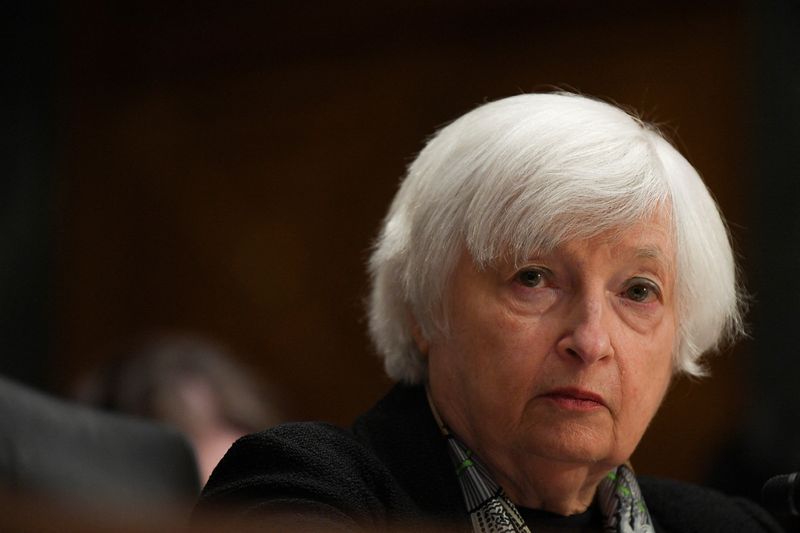Yellen vows to safeguard deposits at smaller U.S. banks, intervene if needed
2023.03.21 13:38

© Reuters. FILE PHOTO: U.S. Treasury Secretary Janet Yellen takes questions on the Biden administration’s plans following the collapse of three U.S. lenders including Silicon Valley Bank and Signature Bank, as she testifies before a Senate Finance Committee hearing
By David Lawder
WASHINGTON (Reuters) -U.S. Treasury Secretary Janet Yellen told bankers on Tuesday that she is prepared to intervene to protect depositors in smaller U.S. banks suffering deposit runs that threaten more contagion amid the worst financial system turmoil in more than a decade.
In a speech aimed at calming nerves rattled by two prominent bank failures this month, Yellen said that the U.S. banking system was stabilizing and steps taken to guarantee deposits in those institutions, showed a “resolute commitment” to ensure depositors’ savings and banks remain safe.
“The steps we took were not focused on aiding specific banks or classes of banks. Our intervention was necessary to protect the broader U.S. banking system,” Yellen told an American Bankers Association conference in Washington.
“And similar actions could be warranted if smaller institutions suffer deposit runs that pose the risk of contagion,” she added in prepared remarks that drew a standing ovation from the assembled bankers after she delivered them.
Yellen, speaking more than a week after the Federal Deposit Insurance Corp (FDIC) closed the failing Silicon Valley Bank and Signature Bank (NASDAQ:), said the “decisive and forceful” actions were strengthening public confidence in the U.S. banking system and protecting the American economy.
In those cases, the Treasury, the Federal Reserve and the FDIC invoked “systemic risk exceptions” that allowed them to guarantee billions of dollars of uninsured deposits, and Yellen said the actions, along with new Fed lending facilities, reduced the risk of further bank failures.
Yellen did not provide details on what further interventions may be warranted, but shifted emphasis toward smaller regional and community banks, which have sought protections to stop deposits from fleeing to larger institutions seen as “too big to fail.”
In a U.S. Senate hearing last week, Yellen said universal deposit guarantees would only be granted to those at failing banks determined to pose a systemic risk.
Some banking groups have called for congressional authority for temporary universal guarantees on all U.S. bank deposits, but the conservative Republican House Freedom Caucus opposes expanding deposit guarantees beyond the FDIC’s current $250,000 limit — a major roadblock to swift action to stem a deeper crisis.
At a separate event, U.S. Deputy Treasury Secretary Wally Adeyemo also emphasized the importance of community and minority-owned banks as the department considers how to further strengthen financial stability.
Yellen said a “dynamic and diverse banking system” was needed to support the U.S. economy, with large, mid-sized and small banks all playing a role in supporting households and small businesses and increasing competition in financial services.
CONFIDENCE BEFORE RULE REVISIONS
The Treasury chief said she is currently focused on restoring the confidence of bank depositors, but will evaluate banking regulations to determine whether adjustments are needed to address the risks that banks face today, which are more focused on interest rates and liquidity than asset quality.
She declined to speculate on what changes may be needed, adding that the Fed would examine why SVB and Signature Bank failed.
She said the Fed’s discount window lending and new Bank Term Funding facility, which allows banks to borrow against certain bonds held at par value rather than diminished market values amid higher interest rates, were working as intended and aggregate deposit outflows from regional banks have stabilized.
A move by large banks to deposit $30 billion into troubled First Republic Bank (NYSE:) last week “represents a vote of confidence in our banking system,” Yellen added.
Yellen said she was keeping in close contact with bankers, state and federal regulators, market participants and international counterparts about the banking situation.
She added that the situation was “very different” from the 2008-2009 global financial crisis, when subprime mortgage assets put many banks under stress, and that the financial system is “significantly stronger than it was 15 years ago.”








